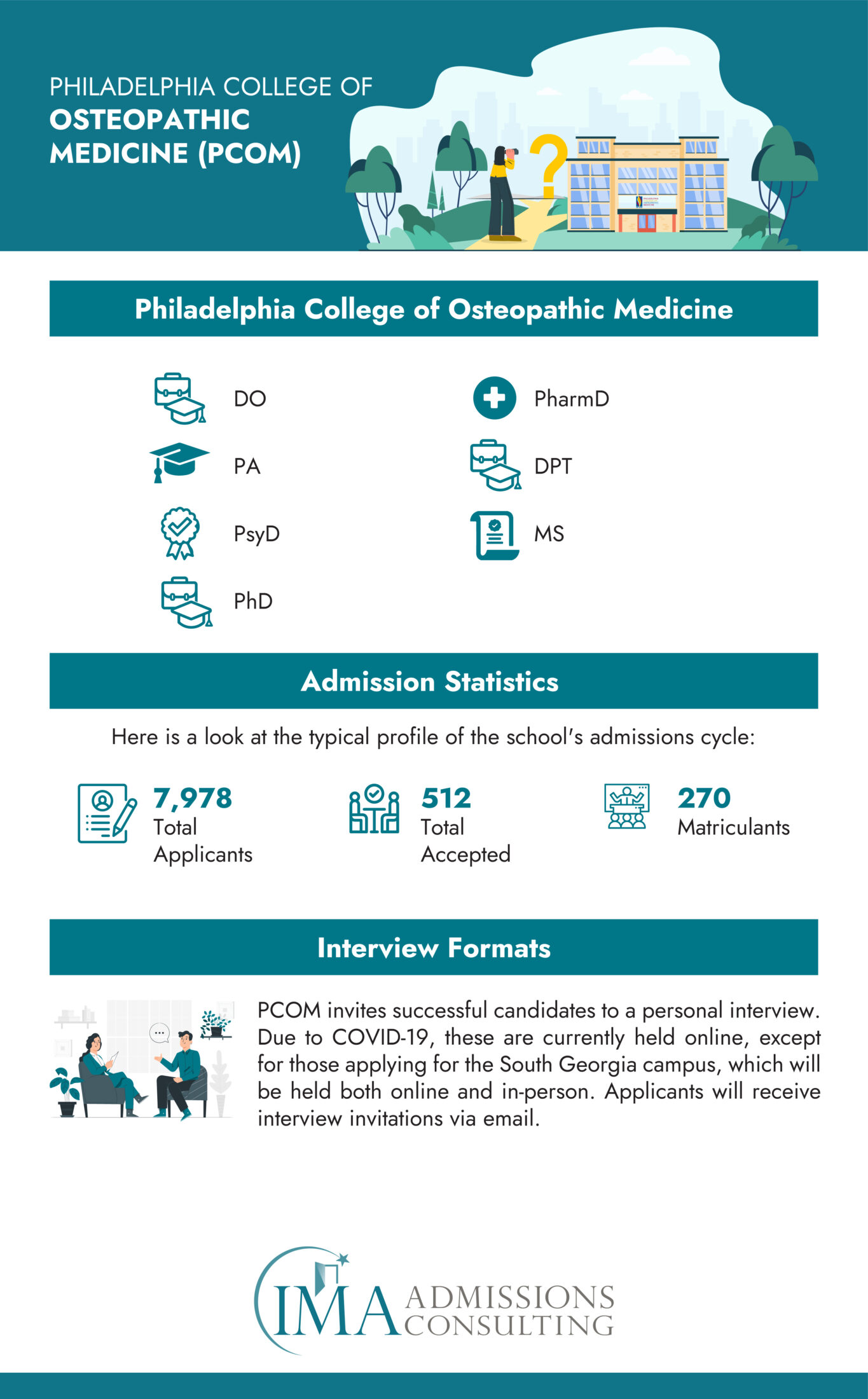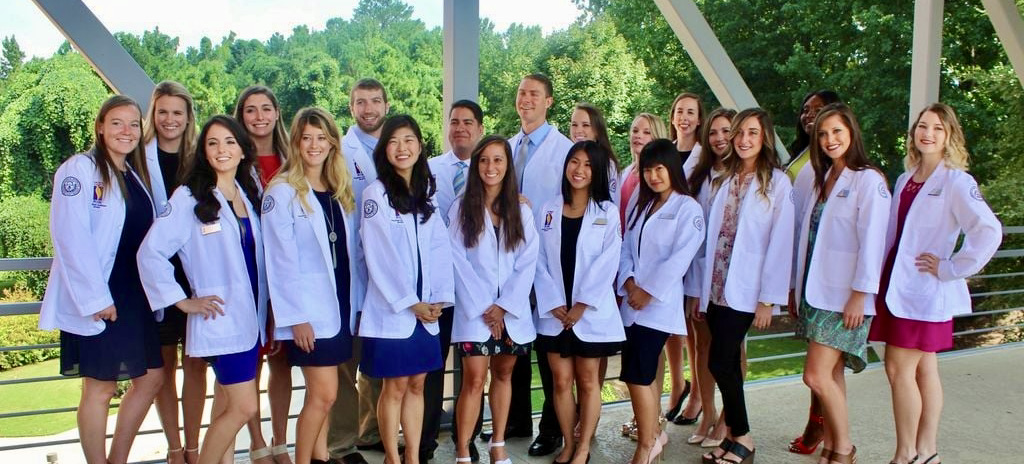The Philadelphia College of Osteopathic Medicine (PCOM) was founded in 1899 and has made itself known worldwide as a school that promotes diversity, academic excellence, teamwork, and training students to be physicians who see their patients.
When it comes to the overall paradigm of thought at the Philadelphia College of Osteopathic Medicine, the belief is that one must practice “whole person” medicine to be a good, quality physician. The concept revolves around treating people, not just symptoms. This is the lesson that students at PCOM will be taught and reinforced daily as they study and practice.With locations in Pennsylvania and Georgia, students of the Philadelphia College of Osteopathic Medicine have several options in terms of the degree or certificate program they want to pursue. Each program teaches students to work with others as a healthcare team, integrate the science of medicine with the art of medical compassion, and solve problems with a whole-person mindset. At each campus, students will find top-notch facilities with modern equipment and technology.
Be an Informed Applicant
Becoming a doctor is no easy feat, and getting into medical school can be the first big challenge you’ll encounter. That’s why we’ve created this guide and our other Medical School Guides. Our goal is to help aspiring physicians achieve their goals by matriculating to the medical school of their choice.
Medical schools, like the Philadelphia College of Osteopathic Medicine, can be very competitive to gain acceptance, so it’s important to be as informed and prepared as possible. Each step of the journey has its own set of complications and requirements. Reading this guide thoroughly, doing your research, and taking advantage of every tool at your disposal is how you will succeed in the application process.
The first step is to make absolutely sure you are applying to the schools that best meet your needs and align with your values. You can start by doing a search for “medical schools near me” or “medical schools in Pennsylvania.” If you come across a school that draws your attention, check to see if we have a Medical School Guide for that school. It may help you make your decision.
This guide will take you through the entire application process, including facts about the school, the primary application, the secondary application, essay prompts, letters of recommendation, interviews, and more.
Topics covered in this guide include
- Why Philadelphia College of Osteopathic Medicine?
- Philadelphia College of Osteopathic Medicine Ranking
- Medical Programs at Philadelphia College of Osteopathic Medicine
- Facilities, Student Organizations, and More
- Selection Factors: What Philadelphia College of Osteopathic Medicine Looks for in an Applicant
- Admissions Requirements for the Philadelphia College of Osteopathic Medicine
- Philadelphia College of Osteopathic Medicine Acceptance Rate & Admissions Statistics
- Philadelphia College of Osteopathic Medicine Tuition & Cost of Attendance
- Philadelphia College of Osteopathic Medicine Secondary Application: Essay Prompts, Sample Answers, and Advice
- Philadelphia College of Osteopathic Medicine Interview Process
- Medical School Admissions Consulting
- Voluntary Healthcare Internships Abroad
Personalized Help
When it comes to the application process, there is no greater help than having someone work with you one-on-one every step of the way. We offer our one-to-one medical school admissions consulting services, which provides individualized assistance with every step of the application process. This includes help with completing your medical school application, advice on essays, interview preparation, and more.You may also want to take a look at our pre-med shadowing study abroad program, which provides some wonderful opportunities for our incoming undergraduates. For more information, click here.
Why the Philadelphia College of Osteopathic Medicine?
Aside from working with incredible faculty members, such as the renowned Jay Rosan, MD who is the co-founder of the Medovation program, there are a number of reasons students pursue PCOM for medical school. As you get to know the school, make sure to take note of the PCOM Academic Calendar, so you have an idea of how the school year runs.
The Philadelphia College of Osteopathic Medicine has earned a reputation for producing some of the finest medical minds in the country. The school was founded in 1899 by two doctors of osteopathy (DO’s) named Dr. Pressly and Dr. Snyder. At that time, there were very few osteopathic doctors in the city of Philadelphia, and the need for osteopathic medical schools in Pennsylvania was blatantly clear. The school grew quickly and went through many changes over the years, but what remained the same was the mission of training doctors who would see patients as a whole and not only treat their symptoms.
Another need in Philadelphia was medical clinics that were open to the underserved population, and PCOM went about meeting that need by opening a rural healthcare center in Sullivan County, Pennsylvania, and in other neighborhoods of Philadelphia. These sites served the community in need while providing students of PCOM with hands-on clinical experience.
It is for these reasons and more that PCOM is known as one of the finest medical schools in Pennsylvania. If you’re looking for DO schools in Pennsylvania, you’ll want to give good consideration to the Philadelphia College of Osteopathic Medicine.
Some of the values that are stressed at PCOM include:
- Accountability to One Another
- Integrity & Respect for All
- Fostering Innovation
- Embracing Diversity
- Teamwork & Collaboration
Diversity and inclusion are highly valued at PCOM. The college has been recognized several times for its efforts at promoting diversity, social justice, and inclusion. School President and CEO Jay S. Feldstein, DO, appointed the President’s Commission on Racial Justice in July 2020 to show the school’s dedication to its values.
Philadelphia College of Osteopathic Medicine Ranking
US News & World Report states that the Philadelphia College of Osteopathic Medicine is ranked:
- #40 in Most Graduates Practicing in Primary Care Fields
- #80 in Most Graduates Practicing in Rural Areas
- #126 in Most Graduates Practicing in Medically Underserved Areas
Medical Programs at Philadelphia College of Osteopathic Medicine
The Philadelphia College of Osteopathic Medicine offers a variety of medical degrees for students to choose from, including:
- Osteopathic Medicine (DO)
- Physician Assistant (MS in Health Sciences)
- Pharmacy (PharmD)
- Physical Therapy (DPT)
- Graduate Medical Education
- Clinical Psychology (PsyD)
- Educational Psychology (PhD)
- School Psychology (PsyD)
- School Psychology (EdS)
- Applied Behavior Analysis (MS)
- Applied Positive Psychology (MS)
- Biomedical Sciences (MS)
- Forensic Medicine (MS)
- Mental Health Counseling (MS)
- Medical Laboratory Science (MS)
- Non-Profit Leadership & Population Health Management (MS)
- Organizational Development & Leadership (MS)
- Public Health Management & Administration (MS)
Doctor of Osteopathy (DO)
The Philadelphia College of Osteopathic Medicine’s DO program is tried and true. It is one of the best DO schools in Pennsylvania, and the program is taught by some of the most knowledgeable and experienced faculty in the state. Graduates of PCOM are providing excellent treatment to patients around the globe and serving in high-ranking positions, teaching, and researching for breakthroughs in medicine.
Some of the highlights of PCOM’s DO program are the innovative high-tech patient simulators and standardized patient actors that prepare students as thoroughly as possible for working in real-life medicine.
This DO program at PCOM takes four years to complete and culminates in a Doctor of Osteopathic Medicine. The focus of the program is to treat the whole patient, including working towards preventing medical issues before they arise. DOs are giving training in Osteopathic Manipulative Medicine (OMM). This method of diagnosing, treating, and preventing illness and injury has been proven highly successful.
Many wonder what the difference is between a DO vs MD program. Doctors of Osteopathic Medicine are licensed to treat patients just like MDs are with medication, surgery, and whatever else may be necessary. Where the two differ is that DOs have a more holistic view of treating their patients. They are more likely to talk with their patients about natural remedies, food as medicine, and treating the patient as a whole person rather than simply trying to fix a few symptoms at a time. DOs tend to be popular in smaller towns, tight-knit communities, and amongst more naturalistic people.
Here is the breakdown of the 4-Year DO Program:
Years 1-2
During the first phase of education at PCOM, which includes years one and two, students will gain a strong foundation in all basic sciences by practicing medicine. They will also be provided with hands-on experiences to learn from, including the use of patient simulators and standardized patient actors. Shadowing experienced physicians is another part of the first phase of education.
Years 3-4
Putting their medical education to use, students will be sent to teaching hospitals where they will work in real-life medical settings with real patients under the tutelage and shepherding of mentor physicians. Their level of responsibility in the clinical setting will intensify with time. The goal is to prepare them for every aspect of working in healthcare.
After the program is complete, a PCOM Match List tells graduates where they will be completing their residencies.
Physician Assistant (PA)
The Philadelphia College of Medicine PA Program is an integrated program that prepares students at the Suwanee, Georgia, campus or the main campus in Philadelphia, Pennsylvania, to be skilled medical providers. The faculty who guide students work closely with them and are, themselves, physician assistants with vast experience and knowledge of the field. The program will cover both the academic and the hands-on aspects of becoming a qualified physician assistant.
Students who are accepted and enrolled will find the program to be comprehensive. The Philadelphia College of Medicine PA program takes about 26 months to complete. The first 14 solid months consist of academic learning of the foundations of medical practice. This will be followed by 12 months of intensive clinical rotations in various fields, including:
- Emergency Medicine
- Family Medicine
- Internal Medicine
- Gynecology
- General Surgery
- Pediatrics
- Behavioral Medicine
Doctor of Pharmacy (PharmD)
The PCOM Doctor of Pharmacy (PharmD) program is only offered at the Suwanee, Georgia, campus. This program is four years long and has a patient-centric curriculum. Students will spend the first three years studying the science behind pharmaceuticals and medical care, and the rest of the time, they will be getting more of a hands-on education by rotating through varying aspects of pharmacy. The final year is made up of clinical rotations. Students are able to explore various specialties and see real practices in motion.
PharmD students can choose between focusing on a concentration or a dual degree pathway. They have the opportunity to take part in one of the three online graduate business programs offered by Saint Joseph’s University.
PCOM PharmD students may also focus on one of the different pharmacy specialties, such as:
- Medical Cannabis
- Acute Care Pharmacy
- Ambulatory Care Pharmacy
- Managed Care Pharmacy
- Nuclear Pharmacy
Doctor of Physical Therapy (DPT)
For those students interested in pursuing the Doctor of Physical Therapy (DPT) degree, you will find yourself immersed in an atmosphere of “whole patient” thinking, high-tech educational environments, and learning how to master the art of collaboration as a team. The DPT program is based out of the Suwanee, Georgia, campus and can be completed in a total of 3 years.
The curriculum is a hybrid of a traditional and a systems-based approach. Students will start by learning the foundations of the human body’s structure and all of the science behind the art of treating it from a physical therapy standpoint. Once a good foundation is established, students will explore common injuries and illnesses that affect the body and how to approach treatment.
- DPT students will study:
- Basic/Foundational Sciences
- Clinical/Physical Therapy Science
- Evidence-Based Practices
- Professional Engagement
- Clinical Experience
- Physical Therapy Electives
Doctor of Psychology in Clinical Psychology (PsyD)
PCOM’s Doctor of Psychology in Clinical Psychology (PsyD) program produces well-rounded psychologists who are able to provide a wide range of treatments to their patients. The school’s value of treating every patient as a whole person carries over into this program. This program is accredited by the American Psychological Association, and they have top-notch faculty teaching the students.
The PsyD program takes 4 years to complete. The first 2 years are spent working through the scientific foundations of human psychology. During this time, students will use standardized patient actors to get as close as possible to real-life patient experiences. This has proven to be a fruitful approach.
Doctor of Psychology (PhD) in Educational Psychology
The Doctor of Philosophy (PhD) program in Educational Psychology at PCOM aims to supply the school systems with psychologists, counselors, and social workers who are there to meet the needs of the students they are assigned. They learn the ins and outs of the educational system, psychological processes, and how to advocate for the minor.
Students are capable of completing the program in 3 years if they are full-time students. Students will be required to complete a doctoral dissertation and should begin it around the 2nd year of the program.
Doctor of Psychology in School Psychology (PsyD)
PCOM’s PsyD program for School Psychology takes anywhere from 5-7 years of study to complete, depending on whether or not students study full-time. It requires a minimum of 111 doctoral credits and four years of academic study at PCOM. Students must also complete a dissertation and a year of internship at the doctoral level.
Continuing Education
PCOM offers a great variety of Master’s programs and certification programs for students to choose from, ranging from Medical Laboratory Science (MS) to Public Health Management (MS) to Mental Health Counseling (MS). A popular program is the Forensic Medicine (MS) program, and Biomedical Sciences (MS) is also a highly sought-after course.For more information on all of the programs available at the Philadelphia College of Osteopathic Medicine, click here.
Facilities, Student Organizations, and More
Facilities
Here is a list of some of the facilities at the Philadelphia College of Osteopathic Medicine:
- Evans Hall
- Zedeck Family Amphitheater
- Rose K. Ginsburg Amphitheater
- O.J. Snyder Memorial Library
- Osteopathic Manipulative Medicine Teaching Center
- Gober OMM Practice Room
- Rowland Hall
- Dr. Michael & Wendy Saltsburg Clinical Learning Assessment Center
- Angus Gordon Cathie, DO, Collection
- Levin Administration Building
- Family Medicine at PCOM
- Research Labs
- Anatomy Labs
- Classrooms
- Student Services
- Computer Labs
Main Campus and Facilities
The 17-acre main campus is in Philadelphia, and it hosts educational classes as well as a healthcare complex. Evans Hall is the main building with two amphitheaters, the O.J. Snyder Memorial Library, practice rooms, labs, research facilities, and a state-of-the-art osteopathic teaching center.
The Dr. Michael and Wendy Saltsburg Clinical Learning and Assessment Center is in Rowland Hall. It boasts an 11,000-square-foot learning lab for students to go to practice what they’re learning on patients and human patient simulators.
The Family Medicine Clinic at PCOM is one of PCOM’s Healthcare Centers, located right on campus, and this is a facility that offers medical treatment to patients from underserved areas of Philadelphia. This is a great place for students to shadow physicians, learn, and get hands-on clinical experience while serving the community.
Student Organizations
National Organizations
- American College of Osteopathic Family Physicians (ACOFP)
- American College of Osteopathic Surgeons – Medical Student Section (ACOS-MSS)
- Association of Military Osteopathic Physicians and Surgeons (AMOPS)
- Gold Humanism Honor Society (GHHS)
- National Community Pharmacists Association (NCPA)
- Sigma Sigma Phi Honorary Osteopathic Service Fraternity (SSP)
- Student American Academy of Osteopathy (SAAO)
- Student American Osteopathic Academy of Sports Medicine (SAOASM)
- Student National Medical Association (SNMA)
- Student National Pharmaceutical Association (SNPHA)
- Student Osteopathic Medical Association (SOMA)
- Student Society – American Academy of Physician Assistants (AAPA)
Professional Organizations
- Anesthesiology Club
- Biomedical Sciences Club
- Dermatology Club
- Emergency Medicine Club
- Geriatrics Club
- Internal Medicine Club
- Obstetrics-Gynecology Club
- Oncology Club
- Ophthalmology Club
- Orthopedic Club
- Otolaryngology Club
- Pathology Club
- Physical Therapy Club
- PLAY Club (Pediatrics)
- Psychiatry Club
- Psychology Society
- Radiology Club
- Sports Medicine Club
Sports, Recreation & General Interest Clubs
- Basketball
- Deck Hockey
- Flag Football
- Ice Hockey Team
- PCOM Fit
- PCOM Pulmonics
- Runner’s Club
- Soccer Club
- Volleyball Club
- Wilderness in Medicine Club
Physical Fitness at the Philadelphia College of Osteopathic Medicine
In addition to the many student organization opportunities and activities, PCOM makes it easy for students to stay physically fit. On the main Philadelphia campus, students have access to the Activities Center. There they will find a variety of physical fitness classes, a large gymnasium, racquetball courts, exercise equipment, and more. There are student basketball, flag football, and soccer teams as well.
For those interested in the PCOM Georgia campus in Suwanee, GA, all students have membership to a fitness center and recreation area with opportunities for outdoor sports and indoor exercise equipment. Furthermore, at the PCOM South Georgia campus in Moultrie, GA, students are given free memberships to the Moultrie YMCA facilities.
Selection Factors: What Philadelphia College of Osteopathic Medicine Looks for in an Applicant
Like most noteworthy medical schools in the country, Philadelphia College of Osteopathic Medicine is competitive to get into. Even getting offered an interview is an accomplishment. If you want to increase your chances of making it to the interview step and beyond, you’ll want to do everything you can to be prepared and to impress the admissions committee.
The admissions committee will be looking for certain specifics in your application. They will be looking to see that you maintain excellent grades in your academic coursework. Your entire college career will be examined, so those preparing for the future should know that it’s important to select the right science courses and to always do your best work.
Make sure to meet with your pre-health advisor frequently during your undergraduate study to stay on track. You should be taking upper-level science classes during your final two years. Make sure all your prerequisite coursework is completed, both science and other.
Another aspect of your application the admissions committee will look for is extracurricular activities that are in alignment with your career goals in medicine. It’s good to be involved on campus and in the community. Make sure you are pursuing activities you enjoy and are passionate about. You can start to immerse yourself in the medical community. You can even ask a DO if you can shadow him/her/them. Volunteer in a clinic or healthcare facility.
Your MCAT score is an important aspect of your application, though the admissions committee at PCOM is definitely looking at more than just scores as they consider you for matriculation. Make sure to study and do your best on the MCAT. Plan ahead and apply early.
Start gathering letters of recommendation early and consider preparing your personal statement.
Ultimately, the admissions committee wants to get to know the authentic you. They want to know more than just your scores and grades. They are looking at who you are as a person, what you will bring to PCOM’s student body, what kind of medical professional you want to become, and what you are passionate about. Show them who you are and why you’ll be a good fit for the program at PCOM.
Here are some of the elements of your application that the committee will be paying attention to:
- Residency – Most PCOM Students Reside in PA
- Citizenship – Must be U.S. Citizen or legal U.S. Permanent Resident
- MCAT Scores – Important but Not the Only Determining Factor
- GPA – Indicator of How You’re Handling Coursework
- Community Service – Character Building
- Clinical Experience – The More, Quality Experiences the Better
- Personal Character – Committee Wants to Know You as a Whole Person
- Letters of Recommendation – How Others Perceive You
Admissions Requirements for the Philadelphia College of Osteopathic Medicine
All qualified candidates for the Philadelphia College of Osteopathic Medicine must prove they have a bachelor’s degree from a regionally accredited college or university. This must consist of a minimum of three years of high-quality coursework.
Applicants must show the committee that they are competent in the following areas:
- Biology
- Physics
- Inorganic and Organic Chemistry
- Biochemistry
- English
*PCOM does not accept CLEP coursework or foreign coursework as standard prerequisites.
Minimum GPA and MCAT Requirements for the Philadelphia College of Osteopathic Medicine
There is no minimum MCAT requirement, but a competitive MCAT score would be above 500 with a minimum of 125 for each subsection. The average MCAT for matriculates of the DO program is 505.
There is no minimum GPA requirement, but the median GPA for applicants is 3.50.
Volunteer Service and Clinical Experience
While there are no minimum requirements at Philadelphia College of Osteopathic Medicine regarding volunteer and clinical experience, the admissions committee does seriously look at clinical experience when determining your suitability for acceptance to the school. The more experience you’ve had in the healthcare system, the better.
The following are some examples of how you might demonstrate your diverse experience to the admissions committee:
- Leadership – Any leadership experience you’ve had is relevant and should be noted. Maybe you’ve served in the student body council, worked in the community in a leadership role, or headed up a medical charity program. Share all of it.
- Clinical Experience – Any hours spent working with patients in a clinical or volunteer setting should be listed. If you’re researching early enough, try to get some clinical experience under your belt. It shows your commitment to your career path.
- Research – PCOM loves researchers, so show them any experience you’ve had with research in the past.
- Volunteer and Community Service – The admissions committee loves to see community involvement.
- Extracurricular Activities – List any extracurricular activities as they show your diverse background and help the committee get to know you as a whole person.
Philadelphia College of Osteopathic Medicine Letters of Recommendation
When it comes to the DO program at PCOM, the admissions committee requires a minimum of 3 letters of recommendation from people who know you in a professional manner. This individual should be able to share information about your character, academic success, scientific understanding, work ethic, commitment to diversity and justice, and more. The admissions committee wants to see letters from:
- Your pre-health advisor (or academic advisor) can attest to your success in your college coursework and commitment to having a career in medicine.
- A faculty member (of the science department is preferred) from your undergraduate, graduate, or post-baccalaureate program. This person should be able to highlight your knowledge and skills in science.
- A physician (DOs are preferred) or healthcare expert who has had some dealings with you in a professional manner. Someone who has overseen any clinical experience you have would be ideal.
If you are unable to provide letters from these specific sources, please submit a letter from individuals who have some experience with you in a medical and professional capacity or from someone who has experienced your character, work ethic, compassion, dependability, etc.
Letters of recommendation must be on letterhead and signed by the author. They must be submitted through AACOMAS to each of the PCOM campuses that you are interested in. They can also be emailed to: recommend@pcom.edu.
Required & Recommended Coursework at the Philadelphia College of Osteopathic Medicine
It is required that candidates will have completed the following coursework:
- Biology with Laboratory (8 Semester Hours/2 with Lab)
- Physics with Laboratory (8 Semester Hours/2 with Lab)
- Chemistry with Laboratory (9 Semester hours/4 with Lab)
- Organic Chemistry with Laboratory (4 Semester Hours)
- Biochemistry (3 Semester Hours)
- English (6 Semester Hours in Composition and Literature)
Does the Philadelphia College of Osteopathic Medicine Require the CASPer Exam?
The Philadelphia College of Osteopathic Medicine does not currently require the CASPer assessment.
Philadelphia College of Osteopathic Medicine Acceptance Rate & Admissions Statistics
PCOM is highly selective when offering a placement to an incoming candidate. Out of 7,978 verified applicants, 512 were accepted, and 270 enrolled. That’s an acceptance rate of approximately 6.4%*. This is competitive for medical schools in Pennsylvania.
Out of those who enrolled, 57.8% identified as female, and 41.9% identified as male.
*The acceptance rate is based on the percentage of applicants who enroll. There are other factors that affect rates.
The Philadelphia College of Osteopathic Medicine Class Profile
The following are statistics regarding the class of 2022-2023:
- Total Enrollment – 270 new students
- Men 114 – Women 156
- Median MCAT – 505
- Median GPA – 3.5

Philadelphia College of Osteopathic Medicine Tuition & Cost of Attendance
These tuition and fees are based on the Philadelphia College of Osteopathic Medicine 2022-2023 academic year. Fees are subject to change. Students are required to maintain medical insurance that is purchased directly through Penn State.
Year 1:
- $57,534 Tuition and Fees
- $702 Books and Supplies
- $23,850 Room and Board, Travel, and Personal Expenses
- $432 Loan Fees
$82,518 Total Estimated COA
Year 2:
- $57,534 Tuition and Fees
- $801 Books and Supplies
- $675 Board Exam
- $23,850 Room and Board, Travel, and Personal Expenses
- $432 Loan Fees
$83,292 Total Estimated COA
Year 3:
- $57,534 Tuition and Fees
- $1,300 Books and Supplies
- $675 Board Exam
- $33,000 Room and Board, Travel, and Personal Expenses
- $500 Loan Fees
$93,009 Total Estimated COA
Year 4:
- $57,534 Tuition and Fees
- $500 Books and Supplies
- $33,000 Room and Board, Travel, and Personal Expenses
- $500 Loan Fees
$91,534 Total Estimated COA
Being knowledgeable about costs and financial aid can help you navigate this complicated system. For more information on the costs of attending medical schools in the United States, visit our Medical School Tuition Database, where we offer detailed guidance and helpful information.
AMCAS Primary Application & Philadelphia College of Osteopathic Medicine Secondary Application
PCOM participated in a program by the American Association of Colleges of Osteopathic Medicine Application Service (AACOMAS). This program makes the application process run smoothly and efficiently. For questions specifically about AACOMAS, visit their website.
Students looking to matriculate to PCOM in the fall of the upcoming school year should apply in the beginning of May. You must submit your application through AACOMAS, including providing them with your official transcripts and letters of recommendation.
PCOM does not have its own secondary application, but essay prompts can be found under the Program Materials section of the application on the Questions tab.
The application fee is $75. Instructions for paying the fee will come following the receipt of the application through AACOMAS.

Philadelphia College of Osteopathic Medicine Secondary Application: Essay Prompts, Sample Answers, and Advice
DO Program
Philadelphia College of Osteopathic Medicine does not have a secondary application for the DO program because they utilize AACOMAS for the entire application process. Instead of essay prompts, there will be a personal statement to write, and the question is a big one:
Why do you want to become an Osteopath?
The AACOMAS personal statement is more specific than others because it asks why candidates want to become an Osteopathic Doctors. This is your moment to really shine and to let the admissions committee know who you are, what you want, and why you want to do it. This is your opportunity to set yourself apart from the other thousands of applicants and to show them your unique character.
The admissions committee wants to know why you have a passion for osteopathic medicine as opposed to a more traditional medical degree. What is it about becoming a DO that resonates with your vision and personal values related to healthcare? Share your strengths and be honest about your weaknesses or potential areas of growth.
Achieving this degree is challenging. It takes many years of dedication and hard work. The admissions committee wants to bring in students who are going to make it to graduation. Share with them why they can expect you to be at the finish line one day.
The personal statement has a limit of 5300 characters, so you’ll want to keep it concise but very genuine and authentic. This is a statement about you, so avoid any generic statements. Let them see who you really are and why you’re going to become an amazing DO one day.
Sample from a personal statement (this is only a section, not the whole statement):
“When I was 13 years old, I was suffering from a lot of anxiety, and my mother took me to see the pediatrician at the clinic near my home. This MD was kind and seemed to listen to our concerns. He sent me away with a prescription for anti-anxiety medication, but I was weary to take it and my mother decided a second opinion would be helpful.
“We heard of a local DO who had opened a practice in the next town over, and they got us an appointment fairly quickly. Meeting with the DO was an entirely different experience. I shared about my anxiety and how I didn’t want to try medication quite yet. This medical professional began asking me about other aspects of my life and health. I ended up telling him about some stomach pain I experienced from time to time, and he explained that it could be tied in with my anxiety. About a month after implementing some dietary changes, my stomach was so much better, and my anxiety was all but gone.
“I always knew I wanted to be a doctor, but it was this experience that revealed to me that I would one day become a Doctor of Osteopathic Medicine. My passion is to treat patients as whole people, not merely one set of symptoms. The body is complex and connected, and I believe Osteopathic Medicine is the best way to bring true healing to patients.”
The Philadelphia College of Osteopathic Medicine PA Program and Other Programs
Applying for the PA program at the Philadelphia College of Osteopathic Medicine, as well as the other programs, goes through CASPA, which is very similar to AACOMAS. The only essay question is, “Why do you want to be a PA?” This follows the same format as the DO program personal statement.
Philadelphia College of Osteopathic Medicine Interview Process
At PCOM, the interview is a vital stage in the application process. Only students who pass through the initial stages will be invited to a personal interview with the admissions committee. These interviews have been held virtually since COVID-19, except for the South Georgia campus, which is both online and in-person.
Preparing for an interview can be stressful. Many students find it helpful to receive personalized coaching and even a mock interview through our medical school admissions consulting services.
Medical School Admissions Consulting
Our primary mission here at International Medical Aid is to make ourselves available to help the next generation of medical students find their way into the top medical schools in the country. There’s no doubt that applying for medical programs can be complex and challenging, but we are always here to help.
One of the best ways to prepare for the application process is to work with one of our admission consultants. Their job is to help you through the application process, including providing tips and advice on essay writing, preparing you for your interview, and making sure your requirements are all in order.
Take a moment to schedule a free consultation with one of our experts here.
Voluntary Healthcare Internships Abroad
For students interested in the valuable opportunity to shadow physicians, spend time with real patients in a hands-on setting, experience the environment of working in a hospital or clinic, and soak up a vast amount of knowledge, IMA’s voluntary healthcare internships abroad program is a fantastic choice.
Our pre-med shadowing study abroad program was designed to give pre-medical and gap-year students real-life clinical experience, learning to approach medical care with a humanistic approach and practicing important communication skills amongst the active medical community.
Please take a few minutes to explore the benefits of our program and reach out if you have any questions.
Good Luck!
As you begin the journey of applying to the Philadelphia College of Osteopathic Medicine, we wish you the best of luck and hope that this guide has shed some light on why PCOM is such an incredible school, how to go about applying, and what to do to give yourself the best possible outcome.
If you’d like some more personal one-to-one guidance, consider our medical school admissions consulting program. This time with a professional can be fantastic for building confidence in your interview skills, making sure Philadelphia College of Osteopathic Medicine is the right place for you, and reminding you of the little details in the application that make all the difference.
Whether you knew from an early age that you wanted to attend medical school or searched for medical schools near me, you have probably discovered many wonderful options. Take a few moments to explore some of our other medical school guides:
h to see if we have a guide for that program. Below is a partial list of the medical guides we have available:
- Geisinger Commonwealth School of Medicine (GCSOM)
- Penn State Medical School
- CUNY School of Medicine
- SUNY Downstate Medical School
- NYIT College of Osteopathic Medicine
- NYU Long Island School of Medicine
- TOURO College of Osteopathic Medicine
- Albany Medical College
- Norton College of Medicine at Upstate Medical University
- Jacobs School of Medicine at the University at Buffalo
- Hofstra Zucker School of Medicine
- Weill Medical College of Cornell University
- University of Rochester Medical School
- Icahn School of Medicine at Mount Sinai
- Renaissance School of Medicine at Stony Brook University
- Albert Einstein College of Medicine
- Ohio University Heritage College of Osteopathic Medicine
- Northeast Ohio Medical University (NEOMED)
- University of Cincinnati College of Medicine
- University of Toledo College of Medicine
- Wright State University Boonshoft School of Medicine
- Ohio State University College of Medicine
- Rowan University School of Osteopathic Medicine
- Hackensack Meridian School of Medicine (HMSOM)
- Rutgers New Jersey Medical School (NJMS)
- Rutgers Robert Wood Johnson Medical School
- Cooper Medical School of Rowan University (CMSRU)
- A.T. Still University Kirksville College of Osteopathic Medicine
- Saint Louis University School of Medicine
- University of Missouri Medical School
- Kansas City University (KCU)
- UMKC School of Medicine
- New York Medical College
- University of Pittsburgh School of Medicine
- University of Wisconsin Medical School
- VCU School of Medicine
- University of Maryland School of Medicine
- Case Western Medical School
- University of North Carolina Medical School
- University of Florida Medical School
- Emory University School of Medicine
- Boston University College of Medicine
- California University of Science and Medicine
- UC San Diego Medical School
- California Northstate University College of Medicine
- Touro University of California
- CHSU College of Osteopathic Medicine
- UC Davis School of Medicine
- Harvard Medical School
- UC Riverside School of Medicine
- USC Keck School of Medicine
- UT Southwestern Medical School
- Long School of Medicine at UT Health San Antonio
- University of the Incarnate Word School of Osteopathic Medicine
- UT Austin’s Dell Medical School
- UTMB School of Medicine
- McGovern Medical School at UT Health
- Johns Hopkins School of Medicine
- McGovern Medical School at UT Health
- The University of Texas Rio Grande Valley School of Medicine
- UNT Texas College of Osteopathic Medicine
- University of Houston College of Medicine
- Texas A&M College of Medicine
- Johns Hopkins Medical School
- Baylor College of Medicine
- George Washington University School of Medicine
- Vanderbilt University School of Medicine
- St. George’s University School of Medicine
- Lake Erie College of Osteopathic Medicine (in Pennsylvania)
- Sidney Kimmel Medical College at Thomas Jefferson University
- Wake Forest University School of Medicine
- Western University of Health Sciences (in California)
- Drexel University College of Medicine
- Stritch School of Medicine at Loyola University Chicago
- Georgetown University School of Medicine
- Yale School of Medicine
- Perelman School of Medicine
- UCLA Medical School
- NYU Medical School
- Washington University School of Medicine
- Brown Medical School
Feel free to contact us if you have questions about the application process or our medical guides.







